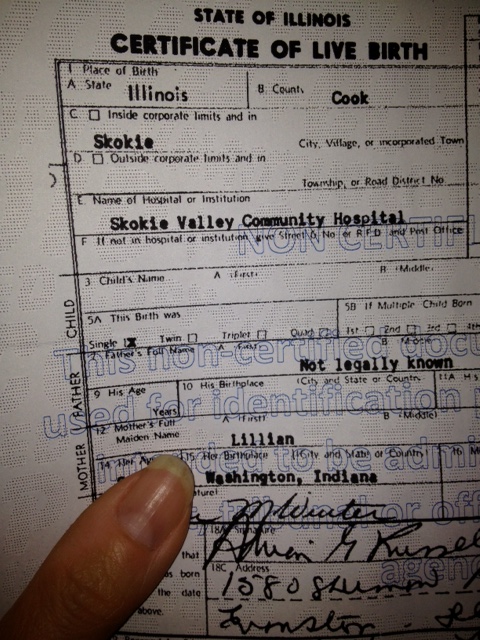I take my original birth certificate for granted. I don’t give it a second thought, even though it was less than two years ago that I got my hands on this document, which revealed my birth mother’s name.
But as an adoptee, I am one of the lucky ones. The only reason I have my original birth certificate is because I come from Illinois, one of the states that has unsealed birth certificates for adopted people. Many adoptees are not so fortunate. They can’t get their original birth documents because of old-fashioned state laws that keep those papers locked up like cold hard cash in a bank vault.
If you are adopted, the original birth certificate is a key to your origins. It reveals the name or names of your original parents, their hometowns, their ages, where they were living at the time of your birth, even whether or not you have a twin brother or sister. These are basic facts that non-adopted people know from day one. Why should adoptees in the 21st century be kept in the dark? It’s just wrong.
Original Birth Certificates Provide Answers
Without my original birth certificate, I never would have been able to find out anything about my mother, Lillian, her children, her husbands or other details about her life and death. My quest to learn about my original family and medical history never would have gone anywhere without that piece of paper. My birth certificate unlocked doors.
Adopted people are not the only ones who want these vital documents unsealed. Lorraine Dusky, a birth mother, makes a compelling case for opening the record vault. “Adopted people are not children all their lives,” she writes. “They grow up and need not only updated family medical information, but they need and desire to be whole and integrated individuals.”
I am glad to see a number of states are starting to recognize the rights of adoptees. In Ohio, adult adoptees will be able to get their original birth certificates under a recent change in state law. Lawmakers in New York and Georgia are considering similar actions. (Here’s an overview of birth certificate access state by state, courtesy of the American Adoption Congress.)
Writing about this has brought back a memory. In 2012, it came in the mail. The original birth certificate from the state of Illinois showed up at my front door. Until that day, I didn’t have a single document related to my adoption, a secret affair that didn’t involve an adoption agency.
My hands shook a bit as I ripped open the envelope. Inside was a non-certified birth certificate containing an honest answer to that basic question I had wondered about for years: Who is my birth mother? No longer was she an anonymous woman who lived in my imagination.
The birth certificate dispelled a couple of myths. Contrary to what I had thought, my birth mother was not a member of my adoptive family. She also wasn’t a teenager. Lillian was a married woman of 28 with four children when she brought me into the world. Of course, my birth certificate did not fill in all the blanks. My father’s name is not listed.
Still, it was thrilling to see the facts for the first time. I was no longer the “undocumented” adoptee. Those kernels of truth got me going on a mission to dig up more truths about my family history.
No adoptee should be denied this experience.



